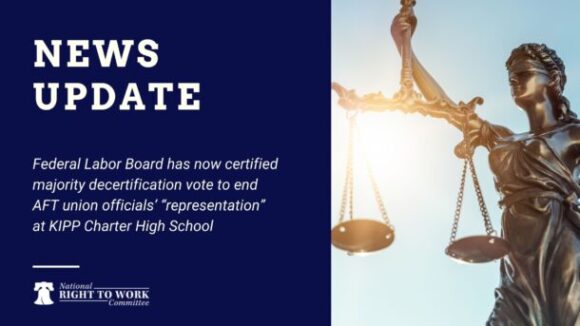Will Team Biden Weaponize Workers’ Pensions?
Big Labor abuse of worker pension and benefit funds as a means of advancing union bosses’ self-aggrandizing policy objectives is a familiar phenomenon.
Last November, when the West Virginia Legislature’s Joint Standing Committee on the Judiciary held a hearing on state Right to Work laws, important testimony was provided by Lillian Graning, the chief communications officer for the Beckley, W.Va.-based New River Gorge Regional Development Authority.
Graning observed that site consultants weigh a lot of factors before they even talk with anyone about the possibility of a new business investment in a locality.
Therefore, since West Virginia was not at the time of her testimony a Right to Work state, her agency never even held talks with site selectors whose clients were opposed to locating in a forced-unionism state. These site selectors simply crossed West Virginia off their list of possible locations before talking to anyone in the state.
That’s why, Graning added, West Virginia public officials who say site selectors don’t bring up the Right to Work issue are missing the point.
In recent years, many senior staff members of prominent business site-selection firms have made the same point as Graning regarding instructions they receive from clients to eliminate non-Right to Work states from consideration before making site recommendations.
For example, in 2011, Mark Williams, the president of Columbia, S.C.-based Strategic Development Incorporated, made the following observation in a letter to the head of the Indiana Chamber of Commerce: “It is not uncommon that clients eliminate states that do not have Right to Work status because of a perception that operations will be less productive in non-Right to Work states.” And just last year, Tracey Hyatt Bosman, managing director of Chicago-based BLS & Co., publicly testified that her clients use Right to Work laws as “a bellwether for the business-friendliness of a location.”
Big Labor West Virginia Gov. Earl Gray Tomblin, who yesterday vetoed legislation to protect employees in the Mountain State from compulsory unionism, is undoubtedly aware of the facts about Right to Work and site selection.
But instead of admitting that forced dues-hungry union bosses were costing his state jobs, Tomblin sought to justify his veto by claiming businesses don’t tell him Right to Work is a barrier to investment in West Virginia. This was pure misdirection. As Graning had already explained, businesses that regard Right to Work as a “must” see no point in belaboring the obvious to public officials in forced-unionism states. They only enter discussions with economic development teams in Right to Work states.
A mountain of data from government agencies and independent private researchers back up site selectors who report that Right to Work is a key consideration for many businesses considering adding sites or relocating existing ones. For example, U.S. Commerce Department statistics show that, from 2004 to 2014, total private-sector employment in Right to Work states grew by 15.9%, nearly quadruple West Virginia’s paltry gain.
Over the same period, Commerce data show aggregate real compensation for private-sector employees grew by 15.5% in Right to Work states. That increase is 85% greater than the average both for forced-unionism states as a group and for West Virginia alone.
The worst aspect of Tomblin’s veto statement was what he didn’t say. He offered no reason whatsoever why the law should authorize the firing of employees for refusal to bankroll a union they don’t want to join, even if those employees have good reason to believe that the Big Labor bosses who have monopoly power to negotiate their job terms are hurting them. As even the late pro-forced unionism law professor Clyde Summers once admitted, union monopoly bargaining often leaves union nonmembers “worse off”:
Full-timers may bargain to limit the jobs of part-timers, seniority provisions may disadvantage younger workers, and wage increases of the low skilled may be at the expense of the high skilled.
Fortunately, shortly before this item was posted, both chambers of the West Virginia Legislature successfully voted to override Tomblin’s Right to Work veto. Consequently, despite his cynical opposition, the Mountain State is now the 26th to prohibit the firing of employees for refusal to pay dues or fees to an unwanted union.


Big Labor abuse of worker pension and benefit funds as a means of advancing union bosses’ self-aggrandizing policy objectives is a familiar phenomenon.

What impact does handing a union monopoly power to deal with your employer on matters concerning your pay, benefits, and work rules have on your pay?

Federal Labor Board has now certified majority decertification vote to end AFT union officials’ “representation” at KIPP Charter High School